Watching history unfold: Student POVs on the ‘Arab Spring’
Popular protests aimed at toppling rulers and promoting democracy have swept across North Africa and the Middle East since December 2010. What do UC Berkeley students make of the events of the so-called “Arab Spring"? Twelve of them share their views.
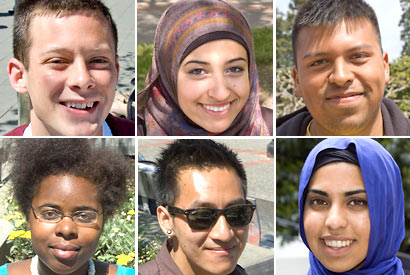
April 14, 2011
Popular protests aimed at toppling rulers and promoting democracy have swept across North Africa and the Middle East since December 2010. Led largely by young people and aided in significant part by social media, these rebellions first took down Tunisia’s Ben Ali and Egypt’s Hosni Mubarak. Now, Syria, Yemen, Bahrain, Jordan and many other Arab nations remain in the grip of upheaval, while the armed conflict in Libya has provoked a controversial intervention by the United States and its allies.
What do students at Berkeley — with its long tradition of student political engagement and its active Muslim student population — make of the events of the so-called “Arab Spring”? What do they think about the Obama adminstration’s response and protesters’ use of social media to organize and communicate?
We made three visits to Sproul Plaza and other parts of campus to hear directly from students. Here’s what 12 of them had to say (photos by Melani King).
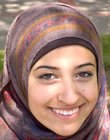 Family ties:A lot of the information I get about the uprising, it’s first-hand experiences. My parents are still there, my brother, my whole family.… Living in Bahrain, a lot of people I went to school with, interacted with, there was this general dissatisfaction with how the government operates. You’d hear about a lot of injustice that is going on, with the government. There are these polarities — people who are really, really rich and are part of the monarchy, and then there’s the really, really poor.Hear more from Fatema
Family ties:A lot of the information I get about the uprising, it’s first-hand experiences. My parents are still there, my brother, my whole family.… Living in Bahrain, a lot of people I went to school with, interacted with, there was this general dissatisfaction with how the government operates. You’d hear about a lot of injustice that is going on, with the government. There are these polarities — people who are really, really rich and are part of the monarchy, and then there’s the really, really poor.Hear more from Fatema
— Fatema Al Zeera, junior, architecture; Hometown: Manama, Bahrain
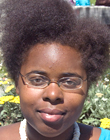 What’s our role?:How much of a hand are we, the U.S., going to have in this? Are we going to be the ones to mobilize and pull Gaddafi out of there very literally? And then what are we going to do with the new government? ‘Cause we didn’t really break it this time, compared to the Iraq thing. You know, ‘you break it you buy it.’ We didn’t really break it, but should we buy it? Are we going to? Is it a problem? Is it a good thing?
What’s our role?:How much of a hand are we, the U.S., going to have in this? Are we going to be the ones to mobilize and pull Gaddafi out of there very literally? And then what are we going to do with the new government? ‘Cause we didn’t really break it this time, compared to the Iraq thing. You know, ‘you break it you buy it.’ We didn’t really break it, but should we buy it? Are we going to? Is it a problem? Is it a good thing?
— Jessica Martin, junior transfer, Japanese and linguistics; Hometown: Alameda, Calif.
 On the U.S. intervention in Libya:There are some resonances with Iraq and Afghanistan. This situation seems to be different. … There seems to be less of a U.S. interest in what’s going on … [though] oil’s a big one. Oil is one of those resonances.
On the U.S. intervention in Libya:There are some resonances with Iraq and Afghanistan. This situation seems to be different. … There seems to be less of a U.S. interest in what’s going on … [though] oil’s a big one. Oil is one of those resonances.
— Victor Gonzalez, junior, English; Hometown: Montebello, Calif.
 A new view:It’s just something new to see a portrayal of people other than these just militantly, zealously religious fanatics. That’s kind of how the whole Middle East is portrayed in the American media.
A new view:It’s just something new to see a portrayal of people other than these just militantly, zealously religious fanatics. That’s kind of how the whole Middle East is portrayed in the American media.
— Jenna Pinkham, freshman, intended physics major; Hometown: Los Gatos, Calif.
 Fast-moving rebellion:It was a bit amazing when it first started, I thought it was a one-time, one-place thing. But then it kept spreading and spreading. It’s been pretty fast that so many countries have started to stand up to their dictators. It’s rather impressive to see what people can do.
Fast-moving rebellion:It was a bit amazing when it first started, I thought it was a one-time, one-place thing. But then it kept spreading and spreading. It’s been pretty fast that so many countries have started to stand up to their dictators. It’s rather impressive to see what people can do.
— Dai Tran, junior, environmental economics; Hometown: San Jose, Calif.
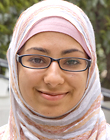 Feelings of pride:As a Muslim I feel really proud that they [the protesters] are doing this. And I feel it should have been done a long time ago, but I’m just going to try to help fuel that fire. Hopefully this will inspire more people, and the fuel will keep on going. …. I don’t know how it is to live in those countries, because I’ve lived here, and I’m really fortunate. But for them to go out in the streets, they must have had a lot of guts. They must believe in something more than themselves.
Feelings of pride:As a Muslim I feel really proud that they [the protesters] are doing this. And I feel it should have been done a long time ago, but I’m just going to try to help fuel that fire. Hopefully this will inspire more people, and the fuel will keep on going. …. I don’t know how it is to live in those countries, because I’ve lived here, and I’m really fortunate. But for them to go out in the streets, they must have had a lot of guts. They must believe in something more than themselves.
— Mahidda Tabraiz, freshman, intended political-science major; Hometown: Santa Clara, Calif. (born in Lahore, Pakistan)
 Full of admiration:You have to have a lot of admiration for these people. When we talk about Libya, we’re in our little comfort zones here, living in the United States. But you have these people protesting against a dictator, literally putting their life on the line.
Full of admiration:You have to have a lot of admiration for these people. When we talk about Libya, we’re in our little comfort zones here, living in the United States. But you have these people protesting against a dictator, literally putting their life on the line.
— Daniah Din, junior, political science and ethnic studies; Hometown: San Jose, Calif. (family is from Pakistan)
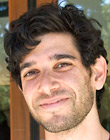 On lending moral support:A lot of these countries are just asking to be recognized. I understand the strategic reasons why Obama might not have made public declarations of support. But I think in some cases it could be useful for our own good — to extend a laurel wreath to the rest of the world … to extend moral support, in some cases, for these uprisings.
On lending moral support:A lot of these countries are just asking to be recognized. I understand the strategic reasons why Obama might not have made public declarations of support. But I think in some cases it could be useful for our own good — to extend a laurel wreath to the rest of the world … to extend moral support, in some cases, for these uprisings.
—Gabe Milner, graduate student, history; Hometown: Baltimore, Md.
 ‘Iran’s Green Movement was a sign’:I don’t want to generalize; it’s very much different not only between different countries but between different socioeconomic classes and different levels of education. But people want to see change and have control of their government and of their destiny. In Iran, the Green Movement [of 2009] was a sign of people taking change into their own hands, and hopefully working toward something better. But we’ll see.
‘Iran’s Green Movement was a sign’:I don’t want to generalize; it’s very much different not only between different countries but between different socioeconomic classes and different levels of education. But people want to see change and have control of their government and of their destiny. In Iran, the Green Movement [of 2009] was a sign of people taking change into their own hands, and hopefully working toward something better. But we’ll see.
— Sharon (not her real name), junior, political science; Hometown: Tehran, Iran (moved to the U.S. at age 10)
 Let’s stay out of it:The United States getting involved — that’s mostly what we [libertarians] are against. We’re totally in support of people trying to fight for their liberties and rights — trying to be free instead of be oppressed by the leaders there.
Let’s stay out of it:The United States getting involved — that’s mostly what we [libertarians] are against. We’re totally in support of people trying to fight for their liberties and rights — trying to be free instead of be oppressed by the leaders there.
— Michael Williams, freshman, intended electrical-engineering and computer-sciences major;
Hometown: Huntington Beach, Calif.
 Wary and optimistic:We certainly have to hope that democratization comes of the uprisings in the Middle East. At the same time, we need to be wary of possible growth of radical movements in the region… So there are a lot of hazards to these uprisings, but also a lot of potential rewards — for the region and for U.S. foreign policy as well.
Wary and optimistic:We certainly have to hope that democratization comes of the uprisings in the Middle East. At the same time, we need to be wary of possible growth of radical movements in the region… So there are a lot of hazards to these uprisings, but also a lot of potential rewards — for the region and for U.S. foreign policy as well.
— Baruch Nutovic, sophomore, history; Hometown: New York, N.Y.
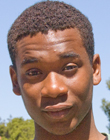 On broadcasting unrest:When we can have a phone to record a beating or an injustice somewhere, and put that on YouTube and get 1,000, 2,000, 100,000, 1 million hits on it — that’s really important. Social media is one of the new, innovative things that has really transformed and revolutionized things.
On broadcasting unrest:When we can have a phone to record a beating or an injustice somewhere, and put that on YouTube and get 1,000, 2,000, 100,000, 1 million hits on it — that’s really important. Social media is one of the new, innovative things that has really transformed and revolutionized things.
— Kevin Williams sophomore, rhetoric (African American studies minor); Hometown: Oakland, Calif.